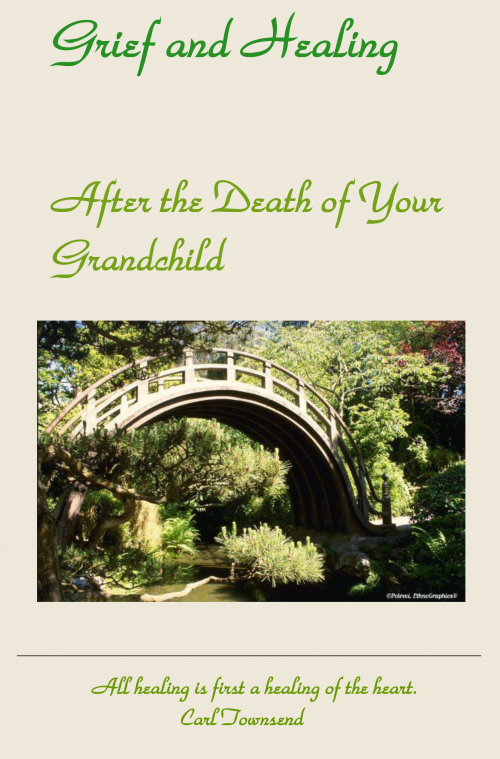
A grandchild and a grandparent touch each other in beautiful and powerful ways. The grandchild links the grandparent to the future, a bridge to time beyond the grandparent’s expected lifespan. The grandparent connects the grandchild to the family history and heritage. Usually the relationship between grandchild and grandparent is free of the tension and drama that mark the child’s interactions with parents. In this freedom, the grandparent often is reinvigorated, behaving as if an inner child has been reborn. The grandchild may take on a maturity and wisdom that less often show up as the child struggles with parental control in order to become an individual.
The death of a grandchild puts the grandparent in the position of dealing with a deep, personal loss, with the sorrow that results and feeling the need to provide support for the child’s parent, the grandparent’s own child, in the midst of one of life’s most awful traumas. In this situation, many grandparents express outwardly their love, concern and support for their children. Their own grief over the death of the grandchild becomes a private, isolated journey.

The question of how to support your child who is grieving the loss of his or her child has a straightforward answer: Tell and show your child that you love him or her. Say the words, “I love you.” “I’m here for you.” Do what you can to ease other life pressures. Babysit siblings, run errands, track down support resources. All of us who are parents struggle with our intolerance for our children’s pain. We want to prevent pain from entering their lives, a task which we never can accomplish completely. We want to relieve their pain when we are unable to prevent it. Most people trying to reach out to grievers try to think of words or actions that will make the person feel better and lessen the pain. This is a noble motivation and it is totally unrealistic. The pain of grief goes away gradually as the grieving person endures the emotions and takes the actions that lead to healing. Others can only provide love and support to help the griever hold up through this experience. Your child will reject your efforts to make things better. Even you don’t have that power. He or she may hide the truth, acting out what you hope rather than sharing with you what is real. Either way, the child ends up deprived of what is most needed – your love and your acceptance of his/her pain, the pain that is normal and natural for a person who has lost a child.


There’s a kind of helplessness that may come with grief. You are facing a problem without a solution. Your grandchild has died and there’s no way to undo that circumstance. Many people look forward to a spiritual reunion or feel an ongoing spiritual connection. That is not the same as sharing life with a living, flesh-and-blood person. In helplessness lies the inclination to endure grief silently and alone, acting like it doesn’t hurt or you’re handling it better than you are. Eventually you may become used to the feelings of loss and think that time has healed you. Sadly, people end up carrying around great weights of accumulated sadness that they thought was behind them just because time had passed. That baggage can result in weariness, a lack of enthusiasm or hope, emotional and relationship problems, even physical health problems.
If you find that your thoughts, emotions and actions are troubling you, interfering with your life and sense of well-being, you can do something about it. The decision to try to get better is very often the point at which helplessness dissolves and improvement begins. Just imagining that there might be life beyond your grief can be a tremendous relief. The alternative is the fear that you may feel this way for the rest of your life. Most people would rather not have to endure that.
Grief is normal and natural. Grief goes with loving. When you love someone, you hurt when that person dies. In a way, it is a cost of loving. Sometimes people wonder, when they are stricken with the deepest pain of loss, if it was a mistake to love so much. When asked, “Would you have had it any other way?” the answer is always, “No!”

Since you have read this far, you probably are affected by grief deeply enough to want to do something about it. What might you do that would help you go through this time of grieving?
Here are a few ideas that have proven helpful to many people:
*Use your resources. Reach out for support from family, friends, members of your faith community - anyone who is part of your network of relationships. If you have established patterns, routines or rituals of spiritual, emotional and physical health, use them to deal with the current state of your life. Praying, journaling, working out and other activities can be valuable aids to both endurance and healing when you are grieving.
*Find new resources. There are all kinds of printed materials to provide information, inspiration and direction that can help grieving people. Ask around, visit a bookstore or library, go online. Look for titles and descriptions that speak to you. There are many grief-related connections online, including websites, articles, chats and blogs, as well as links to local support providers.
*Seek community or professional support. Hospices, funeral homes, faith communities and other organizations provide support groups, informational meetings, classes and counseling for grievers. Grief counselors, mental health therapists, spiritual leaders, chaplains and others can provide individual help as you work through your grief experiences.
The love you shared proves that you are lovable. Now it’s time to love yourself enough to take care of yourself in your grief.


